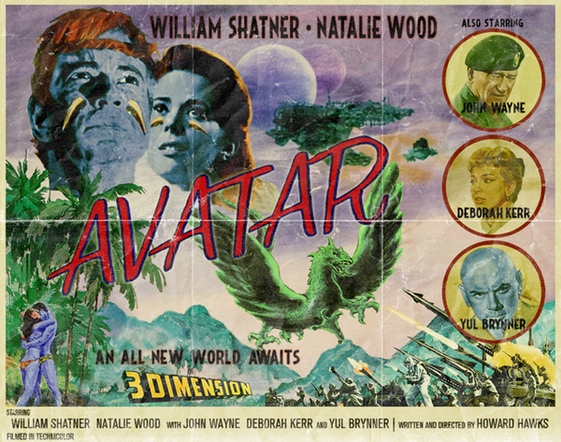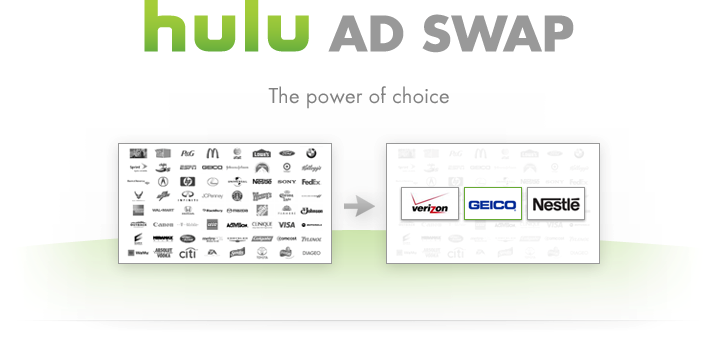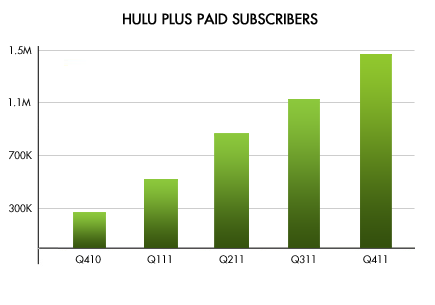Movies From An Alternate Universe ⇒

Movies from an Alternate Universe on the Behance Network - Avatar
These posters are amazing. Look at them closely, there’s lots of film nerdery going on there.
On Hulu and Respect

The Power of Choice
Yesterday, I wrote a quick post on how Hulu really loves ads. In it, I said “I don’t feel like the company respects me as a user.” I’d like to expand on that statement.
I stream content from a Roku LT. On it I watch mostly Netlfix, for which I pay $17.98 for unlimited streaming and one Blu-ray out at a time per month, and Hulu Plus, which sets me back another $7.99. I can’t speak for the experience on other platforms, but on the Roku the Hulu Plus “channel”1 is structured a lot like the company’s Web site. Most of the screen is filled with promoted content, while what you want to get at, the full Hulu library, is pushed to the bottom of the screen. The easiest way to get to a show you want to watch, even if you’ve been watching consecutive episodes of it for days, is to search for it with the on-screen keyboard. Netflix’s channel, in contrast, launches right into a list of everything you’ve watched recently, making it as easy as opening the channel to start watching something. This may be Roku’s problem, it may be Hulu’s, but it’s decidedly the inferior experience.
Then there are the ads. I knew they were going to be there even though I was paying for the service, but I didn’t think they’d be quite as bad as they are. On the Roku, there are significantly fewer ads than on cable or network television. While an ad runs there is a nice countdown clock in the upper left-hand corner that tells you when your program will start. Commercial breaks last anywhere from thirty seconds to two minutes.
There aren’t just fewer ads blocks per episode, there are fewer ads period. If I watch two episodes of the same show in a row (something that seems fundamental to the service), I will invariably see the same ad a few times. It gets annoying and makes me think Hulu barely considered what it’s actually like to try to settle into your couch for hours on end. If they’re trying to replicate the traditional television viewing experience, that’s the lens they should be looking through.
So what about respect? The word isn’t one I introduced into this conversation, it was Hulu’s CEO Jason Kilar. Here it is again:
The innovative Hulu advertising service continues to lead the online video advertising market, with the largest market share of a rapidly expanding market. We have now served over 1,000 brand advertisers in our company’s short history. We are relentless in our mission to be the most effective video advertising service on the planet, which we believe is a function of respecting users and empowering them with tools like Hulu Ad Swap and Hulu Ad Selector.
Let’s break down that last sentence, shall we?
- We are relentless
- We work hard, blah blah blah.
- in our mission to be the most effective video advertising service on the planet,
- Huh, I thought they wanted to serve content to users like me.
- which we believe is a function of respecting users and empowering them with tools like Hulu Ad Swap
- What’s that? “Hulu Ad Swap helps to empower users with more control, while offering advertisers insight into brand effectiveness. The user now has ultimate control and the power to choose their ad experience in real-time. The advertiser will reach a more engaged audience through consumer opt-in, therefore driving higher engagement, brand and message recall, likeability, and purchase intent among users.”
- and Hulu Ad Selector.
- “The Ad Selector puts users in control of their current ad experience with the option of selecting between several commercials that they wish to see. More than 2 out of 3 users have opted into this unique experience that has been described by them as ‘innovative’ and ‘fun.’”
Nevermind that Ad Swap and Ad Selector have near identical names and appear to be redundant services, they’re not available on the Roku. As far as I know they can only be accessed from a web browser. Moreover, the only empowering option I get is…the ability to choose different ads? That doesn’t sound all that innovative or fun to me. What is it about this “video advertising service” that should make me feel respected?
In summing up his state of the Hulu post, Kilar offers this:
As just one example, our dual revenue stream Hulu Plus business model enables us to compensate content owners much more than anyone else in the online subscription market on a per subscriber basis. At scale, our model allows us to profitably pay content owners approximately 50% more in content licensing fees per subscriber when compared to other similarly priced online subscription services.
“Content owners” sounds a lot like “content creators,” (e.g. writers, directors, creative folk, etc.) but they’re not. He’s referring to networks and conglomerates like News Corporation and NBCUniversal. Hulu shouldn’t have to foot the bill for Hollywood’s troubled system, but this wordplay still annoys me. Kilar makes it sound like the company is fueling creative work when really it’s propping up a bloated, broken system.
Then there’s that whole issue of “at scale.” It sounds forward thinking, like scaling Mount Everest, but really it’s the best way he can say that Hulu is a lot smaller than Netflix. According to Kilar’s same blog post Hulu has 1.5 million paid subscribers compared to Netflix’s 21.4 million2. So let’s pretend that, today, Netflix pays every content owner $1 per subscriber. That would mean Hulu pays them $1.50 per subscriber. Pretty good, right? Well, the Hulu content owner walks away with $2.25 million; the Netflix owner? $21.4 million.
It’s the phrase “dual revenue stream Hulu Plus business model” that really gets under my skin. They get you at the door and then they get you in the seats. As a user, I could care less that content owners are getting 50% more than when they go with the other guys since I’m seeing 100% more ads. And as a content owner I’d have to wonder why the bottom line boost is only 50% when there are ads on a subscription service. If advertising has been able to sustain network television which is broadcast for free, shouldn’t the payoff be much greater if customers are paying as well?
Advertising didn’t always exist and there may come a day when we don’t need it anymore. Yes, television has a long history of paying the bills by selling detergent and automobiles, but that system was set up in a different era. Now, with bits flowing freely, people are willing to pay handsomely for the content they want. A company that respects me would put me, the user, first.
In the Hulu’s mission statement, they say their goal is “to help people find and enjoy premium video content when, where and how they want it.” That feels disingenuous. Their real goal is to serve ads, and frankly it seems like they’re not too great at that. Perhaps one day their model will be proven wrong and they’ll be supplanted by a company more committed to the needs of viewers. The alternative is that the legacy format of breaking up content with ads, which was invented over 70 years ago, will follow us into technologies that need not rely on it.
Let’s see what happens.
PIPA Breaks the Internet ⇒
Great explanation of why the PROTECT IP Act would break the Internet.
{::nomarkdown}
Also, you may have heard that SOPA has been shelved, but PIPA is still very much alive. We’re not out of the woods yet on this one.
(via Daring Fireball.)
Scarcity Is A Shitty Business Model ⇒
{% blockquote -Fred Wilson http://www.avc.com/a_vc/2012/01/scarcity-is-a-shitty-business-model.html A VC %} I am sure there was a time when scarcity was a good business model for the film industry. And I am sure that many of the leaders of the film industry came of age during that time. I understand their muscle memory in terms of the scarcity business model. But restricting access to content is a bad business model in the age of a global network that costs practically nothing to distribute on. {% endblockquote %}
Yup.
He’s got 460 comments and counting on this one. Interesting conversation.
Why People Redbox the Movies They Do ⇒
{% blockquote Eric D. Snider http://www.film.com/movies/why-people-redbox-the-movies-they-do Film.com %} But I Am Number Four? The Green Hornet? Come on. Most people had the good sense to avoid these movies when they were in theaters. They didn’t get any better on DVD.
Or did they?
Well, no, not literally. But your expectations are dramatically different when you’re paying a dollar for the entire family to watch a DVD as opposed to $10 apiece at the theater. For most people, “one dollar” is approximately the same as “free.” There’s no investment, no risk. So yeah, everyone said Just Go with It wasn’t very funny. But it’s Adam Sandler, and you’ve laughed at a lot of his stuff in the past, so maybe this one will at least have its moments — and if it doesn’t, so what? It was only a buck. {% endblockquote %}
A lot of good points from Snider about what differentiates Redbox from Netflix. Maybe people just want crap that’s bad for their teeth. Good business model.
Garry Shandling talks King of Comedy ⇒
At a special screening of Martin Scorsese’s The King of Comedy, Garry Shandling spoke of the film’s influence on The Larry Sanders Show:
{% blockquote -Garry Shandling http://www.grantland.com/blog/hollywood-prospectus/post/_/id/41078/garry-shandling-talks-the-king-of-comedys-influence-on-larry-sanders-at-the-first-annual-wayne-federman-international-film-festival First Annual Wayne Federman International Film Festival %} I was very interested in exploring the darkness of human behavior and what we go through in life without being forced to make it funny like a network sitcom. And somewhere in my mind’s eye I remembered about Scorsese and this movie and you see how he filmed a talk show. {% endblockquote %}
Love this movie. Love Larry Sanders.
{::nomarkdown}
{::nomarkdown}
Hulu Really Loves Ads
{% blockquote -Jason Kilar, CEO, Hulu http://blog.hulu.com/2012/01/12/2011-2012-and-beyond/ Hulu Blog, January 15, 2012 %} The innovative Hulu advertising service continues to lead the online video advertising market, with the largest market share of a rapidly expanding market. We have now served over 1,000 brand advertisers in our company’s short history. We are relentless in our mission to be the most effective video advertising service on the planet, which we believe is a function of respecting users and empowering them with tools like Hulu Ad Swap and Hulu Ad Selector. {% endblockquote %}
I signed up for Hulu Plus this month to watch shows on my Roku LT and I have to tell you, I don’t feel like the company respects me as a user.
Other highlights include that revenue in 2011 was up 60% over 2010 to $420 million and Hulu Plus now has 1.5 million subscribers (see chart below). I can think of at least one way they can get more subscribers and, but they really love those friggin’ ads.

Hulu Plus Paid Subscriptions
(via The Verge.)
MPAA Responds to Obama ⇒
I missed this one:
{% blockquote Michael O’Leary, Senior Executive Vice President for Global Policy and External Affairs http://blog.mpaa.org/BlogOS/post/2012/01/14/MPAA-Response-to-White-House-Position-on-Anti-Piracy-Legislation-.aspx MPAA Blog %} While we agree with the White House that protection against online piracy is vital, that protection must be meaningful to protect the people who have been and will continue to be victimized if legislation is not enacted. Meaningful legislation must include measured and reasonable remedies that include ad brokers, payment processors and search engines. They must be part of a solution that stops theft and protects American consumers.
We applaud the continued leadership in the House and Senate for working to enact common-sense legislation to stop foreign websites from stealing American creativity and jobs. Misinformation simply can’t be allowed to replace honest debate, and derail the critically important fight to protect American jobs. {% endblockquote %}
They didn’t leave a statement when Representative Lamar Smith and Senator Patrick Leahy backed off of DNS-blocking. I gather that’s the “measured and reasonable” remedy they’re bemoaning here.
Why applaud Congress but chide the administration? And who isn’t having an honest debate?
Also, the MPAA’s blog looks awful. No wonder they don’t care if the Internet just shuts down.
Lindsay Doran Examines What Makes Films Satisfying ⇒
{% blockquote http://www.nytimes.com/2012/01/15/movies/lindsay-doran-examines-what-makes-films-satisfying.html?pagewanted=all The New York Times %} Ms. Doran is an omnivore who likes movies light, dark and in between. But when she attended the Austin Film Festival last year, “something I found both terribly sad and terribly sympathetic,” she recently recalled, “is that aspiring screenwriters ask again and again, ‘What can I write that a financier wants to make?’ Not, ‘What can I write that fills me with joy?’”
After reading the book “Flourish,” by Martin E. P. Seligman, a catalyst of the positive-psychology movement, she began rewatching films through the lens of what Dr. Seligman identifies as the five essential elements of well-being: positive emotions, engagement, relationships, meaning and accomplishment. (He refers to these elements collectively as perma.) {% endblockquote %}
So happy to see Carrie Rickey have a piece in the Times. She was “my” film critic growing up in the Philadelphia Inquirer where she worked full-time until last October. Great article on the application of positive psychology to screenwriting.
I’m not sure how I feel about Doran’s prescriptions yet, but it’s always nice to hear someone talk about writing a movie you love instead of one that’s easiest to market. Then again, most of the examples cited here are box office hits, so I’ll give this theory a hot minute before it just turns into another “get rich quick” formula by marketers.
Matt Zoller Seitz Forgot His Charger ⇒
Matt Zoller Seitz forgot his laptop charger so he wrote two movie reviews in pen.
{% blockquote -Matt Zoller Seitz http://blogs.indiewire.com/pressplay/putting-pen-to-paper-the-virtues-of-analog-writing Press Play %}
Here’s the thing, though: I found that because I was writing with a pen, I spent less time revising I went and instead spent that time thinking about what I wanted to say, because as you all know, if you write continuously for too long, your hand starts to cramp. And I probably spent more time writing, or thinking about what I wanted to write, because I was disconnected from the Internet and could not check Facebook or Twitter or my various email accounts, or my blog, or anything else online.
{% endblockquote %}
Powering down may not be for everyone, but sometimes trying a different workflow can open your eyes up to how your mind actually works. It’s not quite the same as writing in pen, but this is how I feel about switching from Wordpress to Octopress.
I’m writing more because a layer of the process, managing the backend of the site, has been removed or pared down to its simplest form. I used to compulsively login to my Wordpress install anytime I was in front of a web browser. Now I just wander around the web until the urge to write hits me, and I do so in a text editor that only allows me to write.
But I don’t think I’ll be able to write whole posts in pen and transcribe them. Hopefully Matt will update us on how writing by hand is going after he tries it for a few more reviews.